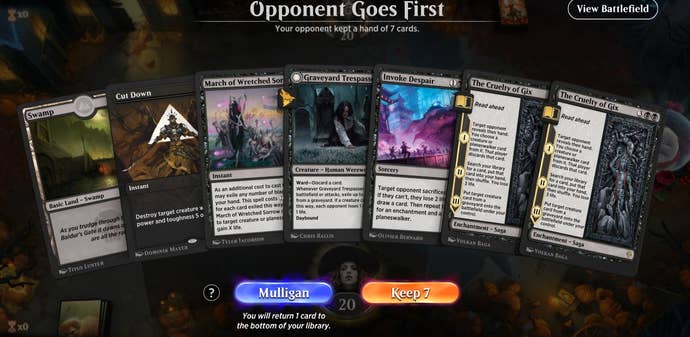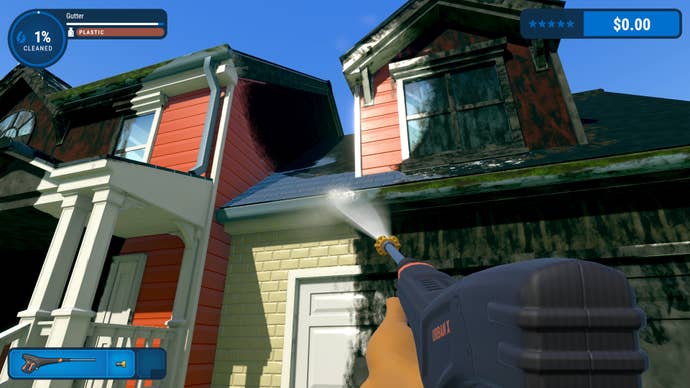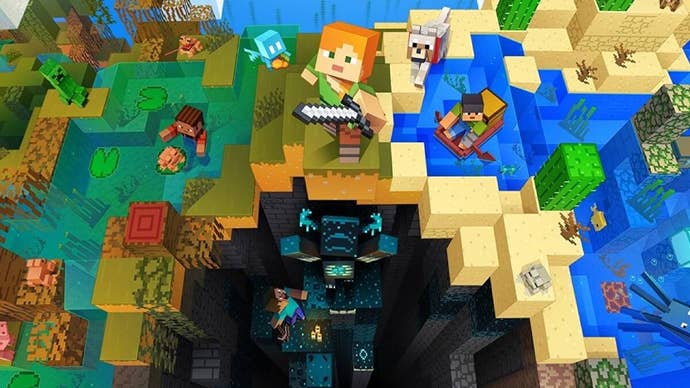Is it wrong to love 'podcast games'?
Magic: The Gathering, Snowrunner, PowerWash Simulator – the era of podcast games is here. But is it right to turn off the sound and replace it with your own?
When we talk about playing games, we usually mean one specific approach: a player focused on the game at hand, with as few distractions as possible pulling them out of the experience. Many of the biggest games out there are designed specifically to encourage this immersion, often actively punishing players if they drift off.
This is not how I would describe my relationship with games. You might be familiar with the notion of the “podcast game,” a game that can comfortably be played with just a fraction of your total attention, the audio either muted or ignored while a podcast, TV show or Twitch stream plays in the background. This has gone from being something I’ll do occasionally to being how I spend most of my time with games, and even factors into deciding the games I play in the first place. What started as something of a guilty habit has in time grown to feel like a new way of understanding how we “play” games.
What makes for a good “podcast game” can vary depending on who you ask, but the best ones all share some common DNA. They need as little story and dialogue as possible, can be challenging but don’t require your constant attention, and perhaps most crucially - they need to have at least some elements of repetitive mundanity. Grinding is a good example: I’ve spent large chunks of my life mindlessly leveling up in Pokémon, a series of podcasts keeping me entertained as I focus on the game just enough to avoid dying.
Maybe my favourite podcast game is Magic: The Gathering Arena, a game I have sunk hundreds of hours into without hearing even a second of the game’s soundtrack. Such a tactical game might not seem like the obvious choice, but its turn-based nature is what makes Arena ideal. I might need to pay attention to work out specific tactics, but I have enough breathing room to take my time with it.

It also emulates the real Magic: The Gathering experience. The paper version of the game, like many card games, is often a more social experience. It’s something to be played over drinks, your attention split as much between catching up with friends as it is working out a strategy to kill their creatures. In this, playing Arena half-conscious more accurately recreates the Magic experience than playing the game ‘as intended’ ever could. It might mean I lose a lot of games through some stupid decision making, but that too is true of my experience with Magic: The Gathering.
Magic isn’t the only game that can take on a new life in this way. I would probably never have considered playing the likes of the off-roading trucking sim Snowrunner without some kind of background noise to accompany it. I know less than nothing about trucks, and frankly I refuse to learn. The idea of playing a game that asks me to make minute alterations to my vehicle as I drive it from thankless task to thankless task sounds hellish to me.
With a podcast, however, Snowrunner is transformed. Suddenly the game feels less like the daily grind of a particularly lonely trucker, and instead reminiscent of long car journeys as a child - staring out into the open road, letting music wash over me just as much as the game itself is washing over me. It’s probably not excellent advice for any actual truckers out there, but the game becomes almost a meditative experience. Spiritual nirvana by way of a 12 wheeler, if you like.

But if there’s any game that feels like it was almost begging you to turn off the music and relish in some background noise, it’s FuturLab’s PowerWash Simulator. The game already trades pretty heavily off its meditative qualities, an experience ostensibly about cleaning implausibly dirty houses and playgrounds that does a lot more to cleanse the tired minds of its players, with an almost trance-like focus on mundane tasks.
It makes for the perfect framework for resting your mind while doing other things. If anything, the less focus Powerwash Simulator demands of you, the better. The mental vacancy of the podcast gamer splitting their attention in half can only elevate the PowerWash experience - conscious enough to clean, absent enough to never question why they’ve spent the past half hour cleaning a fictional van in the first place.

Of course, none of these games necessarily require a passive approach to be enjoyed. But they’re examples of a growing stealth-genre of games, games that can adapt to what “playing” means to you. Maybe you don’t want to be fully tuned in to your latest Snowrunner delivery – Maybe you want to be half-asleep at the wheel while watching Netflix. The game will meet you where you are, you don’t need to muster up the effort if it doesn’t suit you.
Still, I will admit that I do sometimes feel a tinge of guilt about this. It’s hard not to wonder if somewhere, somehow, an audio designer dies a little inside everytime I mute the fruits of their labour. On top of that, I’m also denying myself the full experience that I’ve paid for. Minecraft, an excellent podcast game in its own right, has a soundtrack so iconic you can buy it on vinyl – a soundtrack I almost never actually hear, and by my own choice.
More to the point, can I really be said to have played a game if I’m doing so in such a passive way? After all, have you really watched The Godfather if you’re playing it on mute with Taylor Swift in the background? The answer, I think, is a somewhat muddled one. Podcast gaming is just a different way of experiencing a game, in a similar way to how speedrunners experience games. Speedrunning and podcast gaming might be on the opposite ends of the spectrum when it comes to effort and attention, but are they not born of the same urge to take a game apart to suit the needs of the player?

It was hardly Nintendo’s intention for players to find creative ways to break Mario 64 – such as the infamous backwards long jump, which sees Mario shooting off at high speeds in the reverse direction. Tactics like this are flying arse-backwards in the face of classic game design, but does it really matter?
Games today have a laser-focus on the idea of “player freedom.” It’s what gave rise to the open world genre, after all, offering players a sandbox to amuse themselves in. It’s the same philosophy that has long fuelled modding communities across gaming. I haven’t asked them, but I’m fairly sure Bethesda never intended for Macho Man Randy Savage flying across the skies of Skyrim, and yet that mod is very much available.
Is muting a game’s audio and half-concentrating on something else really any different? If we’ve already accepted that speedrunners can meddle with a game’s mechanics and that modders can change the very content of a game, why not embrace approaching games with a different mindspace too?
Games have long since evolved past the point where we can universally describe the experience of playing them. Podcast games, or passive gaming, is just one such evolution of how games can factor into our lives. Be it by design or by fiddling with a game’s audio settings, passive gaming isn’t going anywhere – it would require too much effort.

